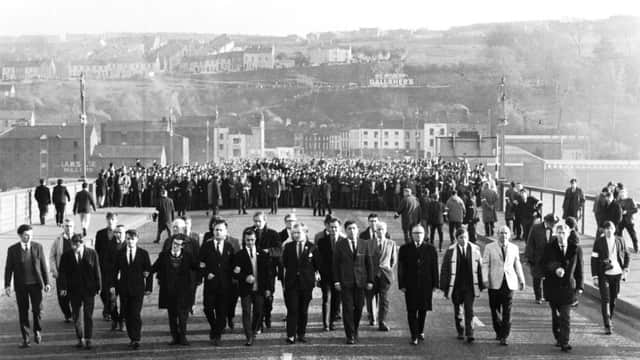November 16, 1968: the day Derry rumbled to sound of marching feet


The Derry Citizens’ Action Committee (DCAC) had already declared that a full-scale march would enter the city centre and, as a result, defy a hastily announced one-month ban on all marches in the walled city.
On the eve of the march, NI PM Terence O’Neill issued a blunt warning to would-be marchers that the “law would be maintained”.
Advertisement
Hide AdAdvertisement
Hide AdThe night before the demo, city centre shopkeepers shuttered their windows and ecumenical vigils for peace took place in the Catholic and Church of Ireland cathedrals. The vigils were attended by thousands of people.
By defying the ban, the DCAC was, for the first time, deliberately breaking the law and there was a real fear that the government might clamp down hard. Fearing that the RUC would try to arrest them and, thus, prevent the march taking place, DCAC members each designated a substitute to take their place.
On the day of the march, it quickly became clear that there was no danger of a repeat of the RUC action on October 5. A sea of marchers, estimated anywhere between 15,000 to 20,000 people, swamped Craigavon Bridge. The march was led by hundreds of stewards and, ahead of them, enforcing the Stormont ban, stood a line of RUC men behind a row of police barriers.
The massive crowd became impatient as the march was halted at the barriers at Carlisle Circus. Scuffles broke out in the crowd as stewards tried to hold marchers back.
Advertisement
Hide AdAdvertisement
Hide AdThe RUC, however, had realised beforehand that they could not hope to control the march without the co-operation of the DCAC. They had secretly arranged that they would allow a token breach of the police line and, therefore, the ban. As a result, a few members of the committee climbed over the barriers, formally defying the ban. The crowd was informed of what had happened and, then, flooded around the cordon and into the city centre by other streets which had been left open.
As the huge crowd filled up the city centre, the RUC was overwhelmed and massively outnumbered. After a short time, police left the city centre to the marchers.
It had become apparent that police simply did not have the capacity to enforce the government ban or to suppress the civil rights campaign by the sort of tactics they had traditionally used against banned opposition marches.
The following Monday, as the Stormont cabinet met to consider the situation in Derry, the ban on marches inside the city walls was repeatedly defied.
Advertisement
Hide AdAdvertisement
Hide AdIt started outside the city’s courthouse after charges were adjourned against 46 local people for offences allegedly committed on October 5. Hundreds of people triumphantly cheered the defendants through the streets. Brief clashes between the group and the RUC sparked off a protest march by several hundred dockers chanting ‘SS RUC’ and, then, a march by more than 1,000 shirt factory women and, finally, a demo by a crowd of 100 youths who paraded around the city walls shouting, ‘We want work’.
DCAC members rushed between the protesting groups to make impromptu speeches and try to ensure the situation did not become violent.
That same day, announcing its intention to take steps to deal with the ‘underlying causes of the current unrest’, the Stormont regime announced its first concession: it would accelerate the Derry Area Plan, speeding up house building and job creation in the city - a minimal concession which only led to calls for further changes.
Over the next week, the DCAC staged a public meeting in Derry city centre at which it said it wanted no more promises from Stormont, but action now.
Advertisement
Hide AdAdvertisement
Hide AdThe unionist government, under intense pressure from Westminster, and having lost all control of the streets in Derry, finally announced proposals for reform.
The reforms - which few in the civil rights movement in Derry regarded as adequate - included a promises that the review of local government in two years time would deal with the issue of ‘one man, one vote’. It was also announced that the Special Powers Act would be abolished as soon as practically possible. There would also be an ombudsman appointed to deal with complaints from the public about the government. Finally, the government announced it would appoint a development commission to replace Derry Corporation and speed up implementation of the area plan. This was viewed as the greatest concession to the civil rights campaign - finally ending unionist control of Derry.
The abolition of the corporation was welcomed but in a mood somewhat short of euphoria. “For this deliverance, at least, thanks be,” as the ‘Derry Journal’ put it.
For his part, John Hume, for the DCAC, said he had no great confidence in the Stormont government. On the issue of one person, one vote, Hume said the DCAC would not rest until this, “the simple background to normal democracy, is put into effect.”
Advertisement
Hide AdAdvertisement
Hide AdThe DCAC also pledged not to relax its vigilance - “just in case”, as the Journal put it, “even that promissory note should bounce”.
As 1968 ended and 1969 began, many people, not without good reason, were convinced NI - as exemplified by 50 years of unionist misrule - was on its last legs. They weren’t wrong.